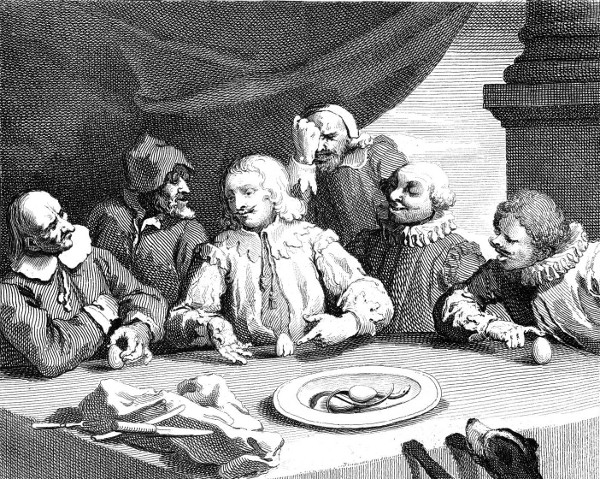
Here in front of me, I’ve got a boiled egg. And the last 10 minutes I’ve been trying to balance the egg on its corner. No. Eggs don’t have corners, of course. I’ve tried to balance the egg on its pointed end. I think I don’t have to tell you that this is an impossible feat, the egg is always rolling over to its side. It’s possible to spin the egg, but after a few seconds the egg will roll again to its side, so this is not a good solution.
This egg balancing problem is not a new problem. It has been around for about 500 years now. Christoper Columbus, remember he was the one who discovered America in 1492, posed the very same problem to several Spanish nobles. And even 500 years ago they could not solve the problem. But Christoper Columbus knew a solution, one which is surprisingly simple. He took the egg and he smashed it on the table. And the egg was standing.
Unfortunately this is easier said than done. Very often we are not even aware of our own assumptions – and therefore are unable to question them. We find ourselves stuck in a problem situation that we can not solve. But once we found a solution to a problem and understand how it is solved, it becomes easy to repeat for anybody.
I want to give you a second example and I’m also going to tell you the solution to it. I know that giving away the answer takes the fun out of it a little bit, so maybe you want to stop the podcast for a while to try it out yourself. To give the whole task some “TOK basis” I’m later going to talk about the assumption that you have to overcome to solve the problem.
All you need is 6 matches or 6 toothpicks or 6 pens/pencils. It does not matter. They should be the same length. And now here is the task: Try to arrange the six matches (or whatever you used) into exactly four equally sized triangles, without breaking the matches. This is not a trick question. If you make 6 triangles, then it’s not right. All of The triangles should be equilateral, this means that the 3 sides should be the same length. Again: 6 matches arranged into 4 equal triangles, with no gaps. Stop the podcast now, and try to solve it.
OK, I’m back again. Most people probably were not able to solve it, at least not quickly. At least, this is what my experience showed me in the past, when I showed the same problem to others. If you tried to arrange the six matches on your flat table, then you already made an assumption which does not allow you to solve the problem. The only way to make the 4 triangles is to make a pyramid with 3 sides and one base. You have to think in 3 dimensions and not in two, like most people. Nobody told you that you were not allowed to use the third dimension. It was your assumption (or at least the assumption of those who could not solve the problem). Again, the solution is easy once you know it, but difficult at the beginning.
Now why do many people initially try to arrange the 6 matches on a two dimensional surface? The answer is simple but at the same time disturbing: Many people are fixed on two dimensions because they are already acquainted with similar puzzles, where the solution can indeed be found in two dimensions. Their previous knowledge about such puzzles limits their view. The question that I am asking myself now is, to what extent our own existing knowledge makes us blind to obtain more knowledge. Can it be that the more we know the more biased we become? This is an interesting paradox. On the other hand, solid knowledge of an area provides the basis to obtain more knowledge in that area, at the same time this knowledge may make us blind for alternative views.
Back to Columbus. I found a quote that summarizes the egg-story in a few lines:
Columbus was dining with many Spanish nobles when one of them said: ‘Sir Christopher, even if your lordship had not discovered the Indies, there would have been, here in Spain which is a country abundant with great men knowledgeable in cosmography and literature, one who would have started a similar adventure with the same result.’
I need to explain this, this is a long sentence. In 1493, one year after the discovery of America, Columbus was invited at a dinner and at this dinner the Spanish nobles said that it was easy to find the New World. They referred to America as the Indies, because they thought that they discovered the eastern coast of India. “Had you not discovered it, somebody else would. There are many smart people here in Spain. It was an easy task.” That’s what they are saying. The story goes on:
Columbus did not respond to these words but asked for a whole egg to be brought to him. He placed it on the table and said: ‘My lords, I will lay a wager with any of you that you are unable to make this egg stand on its end like I will do without any kind of help or aid.’ They all tried without success and when the egg returned to Columbus, he tapped it gently on the table breaking it slightly and, with this, the egg stood on its end. All those present were confounded and understood what he meant: that once the feat has been done, anyone knows how to do it. History of the New World by Girolamo Benzoni, Hakluyt Society, London, 1857.
External Links: More matchsitck puzzles!




